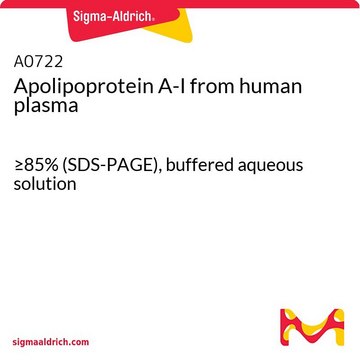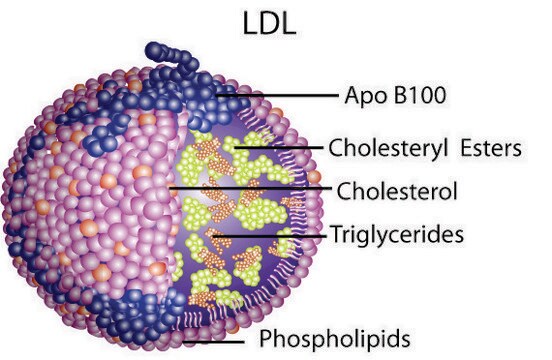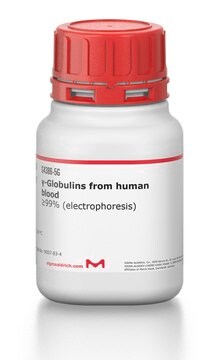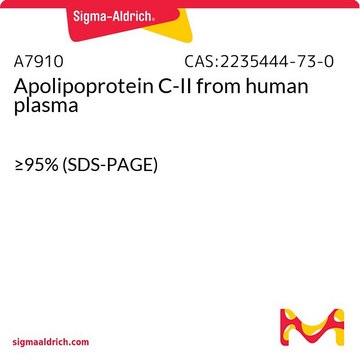ALP60
Apolipoprotein C-III, human
Sinonimo/i:
ApoCIII
Autenticatiper visualizzare i prezzi riservati alla tua organizzazione & contrattuali
About This Item
Codice UNSPSC:
12352202
eCl@ss:
32160405
NACRES:
NA.41
Prodotti consigliati
Origine biologica
human
Livello qualitativo
100
300
Saggio
>95% (SDS-PAGE)
Stato
liquid
Produttore/marchio commerciale
Chemicon®
N° accesso NCBI
N° accesso UniProt
Descrizione generale
Apolipoprotein C-III (APOC3) is a multifaceted protein, localized on circulating triglyceride-rich lipoproteins (TRLs), high-density lipoprotein (HDL), low-density lipoprotein (LDL), and very-low-density lipoprotein (VLDL). The APOC3 gene is mapped to the human chromosome 11q23.3. It is mainly expressed in hepatocytes and to a lesser extent in enterocytes.
Product Source: Human plasma tested negative for HBsAg and HIV-I, HIV-II, HBc and Hepatitis C antibodies. All blood products should be treated as potentially infectious.
Applicazioni
Apolipoprotein C-III (APOC3), human has been used to determine its effect reconstituted high-density lipoprotein (rHDL) containing apoA-I. It has also been used to test the effects of the exogenous exchangeable apolipoproteins on low-density lipoprotein (LDL) binding to heparin.
Azioni biochim/fisiol
Apolipoprotein C-III (APOC3) is involved in triglyceride metabolism and atherosclerotic lesion formation. It also regulates pathological processes involved in atherosclerosis. APOC3 stimulates hypertriglyceridemia (HTG) through various mechanisms. It functions as a lipoprotein lipase (LPL) inhibitor and also interrupts the clearance of triglyceride-rich lipoproteins (TRLs)-remnants. Mutations in the gene lead to lower plasma glycerides and lower cardiovascular disease risk.
The physiological role of Apo CIII is unknown. It is suggested that Apo CIII may inhibit the activation of lipoprotein lipase by Apo CII.
Stato fisico
Liquid in 10 mM NH4HCO3, pH 7.4.
Stoccaggio e stabilità
Maintain at -20ºC or below in undiluted aliquots for up to 12 months. Avoid repeated freeze/thaw cycles. All blood products should be treated as potentially infectious.
Note legali
CHEMICON is a registered trademark of Merck KGaA, Darmstadt, Germany
Esclusione di responsabilità
Unless otherwise stated in our catalog or other company documentation accompanying the product(s), our products are intended for research use only and are not to be used for any other purpose, which includes but is not limited to, unauthorized commercial uses, in vitro diagnostic uses, ex vivo or in vivo therapeutic uses or any type of consumption or application to humans or animals.
Codice della classe di stoccaggio
12 - Non Combustible Liquids
Classe di pericolosità dell'acqua (WGK)
nwg
Punto d’infiammabilità (°F)
Not applicable
Punto d’infiammabilità (°C)
Not applicable
Certificati d'analisi (COA)
Cerca il Certificati d'analisi (COA) digitando il numero di lotto/batch corrispondente. I numeri di lotto o di batch sono stampati sull'etichetta dei prodotti dopo la parola ‘Lotto’ o ‘Batch’.
Possiedi già questo prodotto?
I documenti relativi ai prodotti acquistati recentemente sono disponibili nell’Archivio dei documenti.
Rayabarapu Pranavchand et al.
Lipids in health and disease, 16(1), 116-116 (2017-06-15)
Given the characteristic atherogenic dyslipidemia of south Indian population and crucial role of APOA1, APOC3, APOA4 and APOA5 genes clustered in 11q23.3 chromosomal region in regulating lipoprotein metabolism and cholesterol homeostasis, a large number of recently identified variants are to
Kyung-Hyun Cho
Molecules and cells, 27(3), 291-297 (2009-03-28)
Apolipoprotein (apo) C-III is a marker protein of triacylglycerol (TG)-rich lipoproteins and high-density lipoproteins (HDL), and has been proposed as a risk factor of coronary heart disease. To compare the physiologic role of reconstituted HDL (rHDL) with or without apoC-III
Il team dei nostri ricercatori vanta grande esperienza in tutte le aree della ricerca quali Life Science, scienza dei materiali, sintesi chimica, cromatografia, discipline analitiche, ecc..
Contatta l'Assistenza Tecnica.







